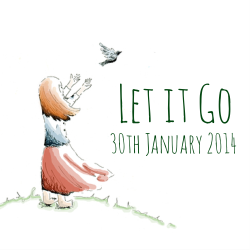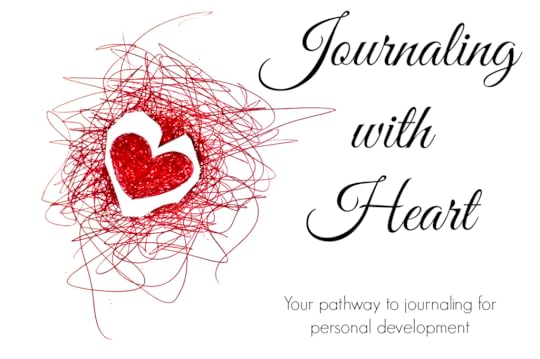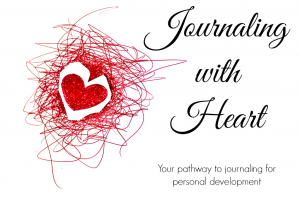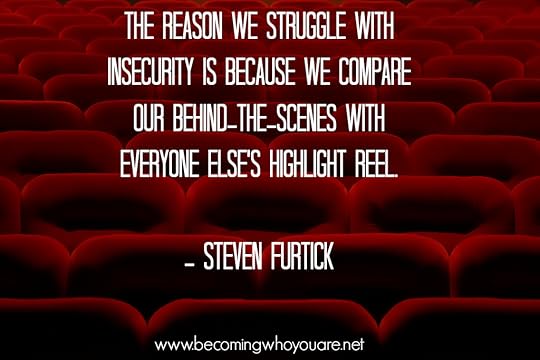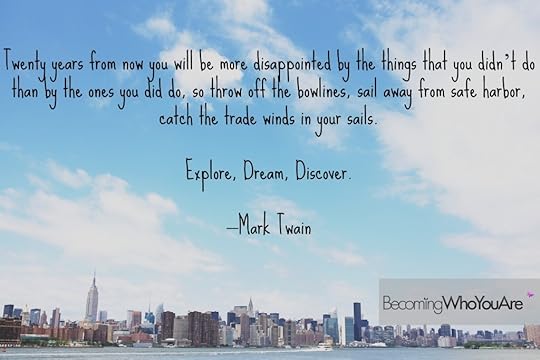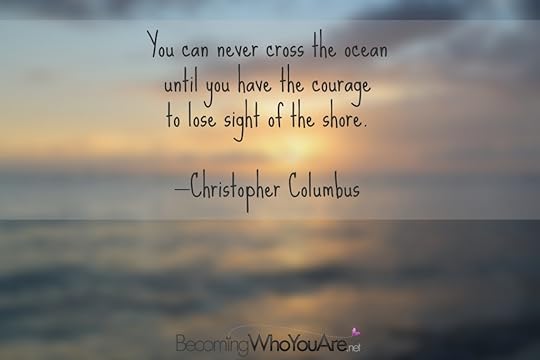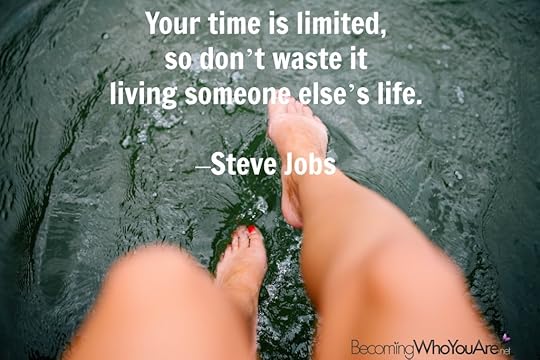Hannah Braime's Blog, page 35
January 28, 2014
Other People’s Opinions Are Not Your Burden to Carry
This post is part of the Let it Go Project: a collection of stories leading up to a beautiful releasing ritual, hosted by Sas Petherick on the 30th of January. All the details for this free event are here. And you can take part! Be inspired by other posts in this project, and share what you are ready to let of of on the Let it Go Project Community Page!
*taps mic, clears throat* Hi, my name is Hannah and I am a recovering people-pleaser.
As someone who has a core value of “freedom”, this is an aspect of myself that I find hard to accept. I want to think of myself as independent and self-sufficient yet, at the same time, part of me really really wants to be liked. So much so, that although “truth” is another core value, I still struggle with prioritising being liked over being real.
This doesn’t just apply to people I like: even if I can’t stand someone, I don’t want them not to like me.
Recently, I’ve been working out where I sit with this issue; I don’t want to be misanthropic, but I do want boundaries. I don’t want to be a lone wolf, but I do want to honour my core values. I don’t want to be mean, but I do want to be real.
And through this process, I’ve realised: “being a people pleaser” or “not being a people pleaser” isn’t a state of being or destination, it’s something that evolves and shifts moment by moment, based on how we show up in each situation and interaction we encounter.
A couple of weeks ago, I had an experience that validated this realisation. It was a pretty ordinary experience but, coming from where I’m coming from, it opened up a world of letting go: letting go of guilt, letting go of other people’s opinions, beliefs and projections, and letting go of the idea that I need to be either real or liked.
My partner and I had gone to Sayulita (aka my favourite place on Earth) for the weekend to chill out after an exhausting week. We sat on a quiet part of the beach, him listening to an audiobook and me reading. A hippy-looking guy with long hair, and a young kid in tow, approached us, holding out a pair of ear buds. He asked us whether we wanted to listen to some music and, wanting to get back to my book, I declined.
Him: “It’s from Sayulita…”
Me: “No thanks, I’m good.”
Him: “You don’t like music? You don’t even want to try it?”
Me: “I do like music, but not right now, thank you.”
Him: “Where are you guys from?”
Me: “England.”
Him: “England? Well… you know, maybe you need to open your minds and try new things. Nice people, they open their minds, they try new things. Maybe you need to open your heart first, then you can open your mind. Something to think about.”
Nice people, they open their minds, they try new things.
Maybe you need to open your heart first, then you can open your mind.
Beneath his words, I heard:
You’re closed-minded and closed-hearted. You are not nice.
That hit a nerve; being open-minded and open-hearted are qualities that are important to me. As for nice, I could feel my inner people-pleaser’s guilt-tinged protest rising up “But I do have an open mind! And an open heart! I’m a very open-minded and open-hearted, nice person. Really!”
But I didn’t say anything. I noticed that internal protest, noticed its intention, noticed that old pattern, and also noticed the part of me saying “Who is this guy anyway? Let it go…”
So I sat and waited while he repeated that maybe we needed to open our minds, open our hearts, and how nice people do that, all with a little smile on his face. And I noticed what it felt like, all the sensations rolling around inside me.
After we said nothing and he left, I relaxed. With that relaxation came understanding and, with that, release.
I can experience that part of me that wants to be liked, and just sit with it.
I can hear someone’s expectation and choose not to fulfil it.
My responsibility is to myself; how people respond to me is theirs.
and,
It doesn’t matter if someone thinks I’m closed-hearted, closed-minded, and not nice:
Other people’s opinions of me are not my burden to carry. (tweet this)
This is what letting go, and change in general, is about. It’s not about reaching a place in our journey, arriving at a state of being, or approaching a fixed point of permanence.
Letting go is a process that happens moment by moment and decision by decision. What will your decision be today?
Thanks for reading. If you know someone who might be interested in this post, please share it using the buttons below.
Get the free ebook “The 5 Most Common Blocks to Authenticity… and How to Overcome Them” plus weekly updates, product discounts and much more:
Photo Credit: Camdiluv ♥ via Compfight cc
Illustration: Kristin Noelle
The post Other People’s Opinions Are Not Your Burden to Carry appeared first on Becoming Who You Are.








 Related StoriesHow to Overcome Resistance to Journaling: My 2014 Journaling Expo PresentationSelf-love and Acceptance with Lori Deschene from TinyBuddha.com (Part 1)SeIf-love and Acceptance with Lori Deschene from TinyBuddha.com (Part 1)
Related StoriesHow to Overcome Resistance to Journaling: My 2014 Journaling Expo PresentationSelf-love and Acceptance with Lori Deschene from TinyBuddha.com (Part 1)SeIf-love and Acceptance with Lori Deschene from TinyBuddha.com (Part 1)
January 23, 2014
Are You Avoiding Pain or Seeking Growth?
This question is alive in my mind right now.
It’s arisen from deciding to serve as many people as possible, be a better coach—the best coach I can be—and joining a mastermind group that supports and encourages both those things. It’s arisen from the new year, a quarter life not-crisis-but-period-of-intense-reflection based around the question “Who do I need to become in order to do the things I want to do?” It’s come from connection, questioning, and conversations with other people who are on a similar journey to mine.
Are you avoiding pain or are you seeking growth?
Do you live your life with the primary motivation to avoid pain, or do you live your life with the primary motivation to grow into the best version of yourself you can be, and enjoy the benefits and rewards that come with that?
When I ask myself this question, the honest answer is that I’ve spent most of my life acting to avoid pain. There’s been a lot of pain, and the process of acting to avoid it has somewhat become a habit. It’s like if you’re living in a house that keeps spontaneously catching fire, your primary focus is going to be catching and putting out fires. Replacing the carpet, adding quirky knick-knacks, and creating a make-shift yoga studio in that corner by the window… none of that matters if it could all be burned to a crisp at any minute.
The issue comes when the fires stop, but we’re still behaving like they could begin again at any moment. Or when the fires stop, but putting out fires feels so familiar that we unconsciously re-create them by leaving candles burning unattended or practicing fire-swallowing indoors.
When I look at my life, I realised I’m done with the fire-fighting; that stage is over. I’ve worked on the areas of my life that weren’t lining up with my values, I’ve worked on healing my relationship with myself, I’ve worked on distancing myself from toxic relationships, and I’ve worked on shifting from coping to thriving.
And this is where I’ve stopped until now.
Although I’ve spent a lot of time and energy sorting my shit out, it’s all been about avoiding pain. Once the source of the pain has been rectified, part of me is like “Cool beans, that’s done, now we can sit back and take it easy.”
Which misses the most crucial and extraordinary part of what it means to be truly alive.
Getting rid of the negative in our lives is just one step. The real magic happens when we multiply the positive. (tweet this)
Let’s take exercise as an example. In the past, I’ve started exercising when I’ve noticed that I’ve put on a couple of pounds (pain). Once I feel happier with my appearance (pain avoided), I stop, before the whole cycle begins again.
Now, I’m trying to exercise just because I feel better when I do, and because I want to run a half-marathon this year (dodgy knee permitting). Am I going to be in pain if I don’t run a half? No. More lie-ins and less leg-ache for me! But the reason I want to do a half is because I want to grow, physically and mentally. It’s about pushing my self-imposed limits and stretching the boundaries of what I previously thought I could do.
The more I’ve explored how this mindset showed up in my own life, the more I’ve realised that I’ve been operating most of my life based on this cycle of creating then avoiding pain: from big areas like money, work, and relationships, right down to how I manage my inbox, day-to-day life admin, grocery shopping, and so on. I leave things until the last minute, I don’t manage my time too well, and consequently most of my energy goes on putting out fires and avoiding pain in my daily life, which doesn’t leave much room for actual growth.
I’m calling time on that, starting right now.
I already have goals for this year, and I’m pretty pleased with how they’re shaping up so far, but I want 2014 to be about acting based on seeking growth, rather than acting based on avoiding pain.
That means asking that question: “Who do I need to become to do what I want to do?” and listening to the answer. It means responding to people in a timely manner (still working on that one—sorry if I owe you an email). It means doing things in advance rather than rushing at the last minute (ahem, taxes from 2012-13 that I have a week left to file…). It means arranging my life in such a way that I can shift my focus from what I need to solve right now to what I need to do in order to grow and create in the future.
It means wanting the best for myself.
Join me?
Thanks for reading. If you know someone who might be interested in this post, please share it using the buttons below.
Get the free ebook “The 5 Most Common Blocks to Authenticity… and How to Overcome Them” plus weekly updates, product discounts and much more:
The post Are You Avoiding Pain or Seeking Growth? appeared first on Becoming Who You Are.









CommentsThanks Eric! Yes, I agree that how we perceive the world does ... by Hannah BraimeLove this. Excellent post. Avoiding pain leaves you spinning in ... by Eric UngsRelated StoriesThe True Meaning of KindnessHow to Overcome Resistance to Journaling: My 2014 Journaling Expo PresentationEpisode 53: Journaling as a Lifestyle with Nathan Ohren
January 18, 2014
How to Overcome Resistance to Journaling: My 2014 Journaling Expo Presentation
Hello friends,
I’m really excited to be able to share two videos with you today! These are the two halves of my presentation at the 2014 Journaling Expo on Sunday 12th January, which was called ”A Friend When We Most Need It: How to Overcome Resistance to Journaling”.
The presentation covers three main topics:
1. How resistance manifests
2. Why resistance occurs, and
3. How we can overcome resistance
The audio quality is not the best but I hope it’s still listenable. If you’d like to take a closer look at the slides, you can view them on Slideshare here:
2014 Journaling Expo Presentation Part 1
2014 Journaling Expo Presentation Part 2
Tweetable takeaways
Feeling resistance? Ask yourself: “What am I afraid of?” – via @becomewhour http://bit.ly/LtXz6e
Don’t forget that registration for Journaling with Heart closes on Sunday 19th—that’s tomorrow! If you want to dive into a 4-week journey with like-minded journaling enthusiasts and develop greater self-trust, self-awareness, and authenticity, click here to learn more and register.
Thanks for reading. If you know someone who might be interested in this post, please share it using the buttons below.
Get the free ebook “The 5 Most Common Blocks to Authenticity… and How to Overcome Them” plus weekly updates, product discounts and much more:
The post How to Overcome Resistance to Journaling: My 2014 Journaling Expo Presentation appeared first on Becoming Who You Are.








 Related Stories3 Self-Compassion Exercises for the Holiday SeasonWant to Change Something? Here’s What Worked for MeHow to Grow with Your Business
Related Stories3 Self-Compassion Exercises for the Holiday SeasonWant to Change Something? Here’s What Worked for MeHow to Grow with Your Business
January 17, 2014
Episode 53: Journaling as a Lifestyle with Nathan Ohren
In this episode, I’m talking all things journaling with Nathan Ohren, founder of Write for Life and host of the award-nominated podcast Journal Talk. We both battled through our colds to record this conversation and, against all odds, we had a great chat! Nathan has been journaling for 28 years and has a lot of wisdom to share about journaling and personal development.
We discuss:
Nathan’s personal journaling story
The three ingredients for a sustainable journaling practice
How creating a habit out of journaling helps us get to life-changing material
Handwritten journaling vs. digital journaling
Nathan’s top tips for dealing with resistance to journaling
…and more!
At the end of the episode, Nathan reveals that he was nominated for the health and fitness category in the 2014 Podcast Awards. The awards ceremony took place earlier this month and a different podcast was ultimately chosen for the final prize, but he did amazingly well to be nominated alongside giants like ESPN, Disney and NPR! Congrats Nathan!
Useful Links and Resources
Create Write Now by Mari McCarthy
Getting Started Staying Started: Nathan’s course for journaling all year round.
The Ultimate Guide to Journaling: my short and snappy guide that tells you everything you need to know to start a journaling practice
Easy Journaling: A useful resource for journaling in the digital age
Say Hello
Nathan:
Twitter: @write4lifecoach
Facebook: facebook.com/write4lifecoach
Website: write4life.us
Email: write4lifecoach@gmail.com
Hannah:
Twitter @becomewhour
Facebook: www.facebook.com/becomingwhoyouare
Website: www.becomingwhoyouare.net
Email: hannah@becomingwhoyouare.net
Subscribe to the Podcast
Don’t forget that registration for Journaling with Heart closes on Sunday 19th—that’s in 2 days time! If you want to dive into a 4-week journey with like-minded journaling enthusiasts and develop greater self-trust, self-awareness, and authenticity, click here to learn more and register.
Thanks for reading. If you know someone who might be interested in this post, please share it using the buttons below.
Get the free ebook “The 5 Most Common Blocks to Authenticity… and How to Overcome Them” plus weekly updates, product discounts and much more:
The post Episode 53: Journaling as a Lifestyle with Nathan Ohren appeared first on Becoming Who You Are.









 Related StoriesHow to Grow with Your BusinessThe Five Foundations of Self-Kindness3 Alternatives to New Year’s Resolutions
Related StoriesHow to Grow with Your BusinessThe Five Foundations of Self-Kindness3 Alternatives to New Year’s Resolutions
January 15, 2014
5 Ways to Release Emotional Baggage so You Can Grow with Your Business
The Jump Blog Tour is hosted by Stephanie Hall and Ashley Wilhite, the co-creators of Jump: Into your business, your life, your dream, a must-have digital guide for new coaches & creatives. They believe in the transformational power of taking the jump and creating a business you love. This all-inclusive eBook will teach you how to start a business, find your niche, brand like a pro, and make the jump with confidence. Find out more here.
When you start your own business, you enter into two types of education: an education in business and marketing, and an education in self-discovery.
As your business emerges, grows wings, and takes flight, any emotional baggage or unfinished business around business-related topics will come to the surface. These include:
Money
Success
Failure
Self-promotion
Self-worth
Vulnerability, uncertainty and risk
Relationships
Work ethic
Challenges
The beginner mindset
Competition
If you want your business to succeed, you need to grow with your business. (tweet this)
If you don’t grow with your business, sooner or later your emotional baggage will start holding your business back or, worse, lead to crash and burnout.
Here are five steps you can start taking today to make sure your personal growth keeps up with your flourishing business.
1. Identify the value you offer
Each night, write down three to five ways you’ve added value to the world that day. This could be anything from sharing a blog post to hosting a workshop. The more you practice identifying and acknowledging the many ways in which you’re adding value to the world, the more confident you’ll feel around the value you offer and the more you’ll communicate that to other people.
2. Focus on how you can best serve your customers
As a new business owner, it’s easy to get preoccupied with what other people think of us and view everything we do from the perspective of “I, myself, and me”. The truth is that our business isn’t about us, it’s about the value we provide to customers. When we prioritise service to others over worrying about ourselves, we stop tying ourselves up in nervous knots, take the pressure off, and provide a better experience overall for clients and customers.
3. Make time for self-discovery
I totally get that you have a million and one other things to do (then another three million after that), and I’m right there with you in that giant puddle of to-dos, but ignore this step at your own peril.
It doesn’t matter how many blog posts you publish in a month or new connections you make: unless you address the limiting beliefs you have about yourself and your work, they’re going to hold you and your business back. Making time for self-discovery doesn’t have to disrupt your whole day; it could be as simple as getting up 15 minutes earlier and spending those 15 minutes journaling, meditating, reading, and learning more about yourself.
You are your most important business asset. Invest in yourself, and your biz will reap the rewards. (tweet this)
3. Get support
Although I identify as an introvert and am as happy as a clam hanging out by myself, even I started to find the “solo” part of “solopreneur” a little too lonesome at times. Luckily, all we need to do to find support these days is to hit the interwebs and look at where fellow business peeps congregate.
You can get support from Facebook groups with like-minded entrepreneurs, form an accountability group, seek out a mentor, or get business coaching. When you’re surrounded by other people dedicated to setting up their own business and serving other people, you’ll be inspired to learn, grow, and you get to realise that you’re not alone in going through this process.
4. Do at least one thing every day that makes you uncomfortable
The most effective way to overcome fear and anxiety is to do the thing that provokes fear and anxiety. Repeatedly.
Your daily discomfort might include reaching out to connect with someone you really admire, pitching to a new client, publishing something a little more personal on your blog, or anything else that takes you out of your comfort zone. The more you expand that zone, the bigger it will get, and the better able you’ll be to deal with discomfort in the future.
5. Adopt the NAFGO mindset
Starting your own business is exhilarating, challenging, and everything else—all at once. You will face difficult periods, dark nights of the soul, and stretches of time when you second-guess every decision you make. And, ultimately, you have a choice. You can let these experiences stop you in your tracks, or you can breathe, let the feeling wash over you, and say “Not another f***ing growth opportunity…”
Because that’s what every challenging experience and uncomfortable feeling is: a chance to grow, to learn how to trust ourselves more, and to develop a better understanding of what makes us us.
Self-discovery is a never-ending process. Whatever stage of business you are in, you have more self-discovery ahead of you. But if you make time to work on yourself as much as you work on your business, you’ll have everything you need to create the business and life of your dreams.
How have you grown with your business? Leave a comment and share your story.
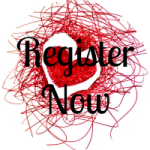
Registration for Journaling with Heart closes this Sunday (19th)! If you want to spend four weeks exploring your inner life through writing and art in a small circle of like-minded journaling enthusiasts, sign up here. The course includes peer support, group coaching, email lessons, guided journaling prompts, expert interviews and more. Start your 2014 with deeper self-trust, self-knowledge and authenticity. Click here to learn more and register.
Thanks for reading. If you know someone who might be interested in this post, please share it using the buttons below.
Get the free ebook “The 5 Most Common Blocks to Authenticity… and How to Overcome Them” plus weekly updates, product discounts and much more:
Photo Credit: Karen Roe via Compfight cc
The post 5 Ways to Release Emotional Baggage so You Can Grow with Your Business appeared first on Becoming Who You Are.








 Related StoriesThe Five Foundations of Self-Kindness5 Ways to Inspire Your Journaling PracticeChristmas Party Games for People Who Love Self-Discovery
Related StoriesThe Five Foundations of Self-Kindness5 Ways to Inspire Your Journaling PracticeChristmas Party Games for People Who Love Self-Discovery
January 13, 2014
The Five Foundations of Self-Kindness
I used to think that kindness was about being nice, giving before receiving, and exuding positivity. As I started to learn more about myself and explore what that word really meant to me, I discovered that the real meaning of kindness was quite different.
Many of us make an effort to be kind to the people we love, but we rarely extend that same effort to our relationship with ourselves. When I started working on my self-relationship, I didn’t even know where to start. It took a few years of fumbling, stumbling, and experimenting until I could identify what, for me, are the five foundations of self-kindness:
1. Acknowledge and accept reality
Being 100% honest with ourselves is a natural state of being, but one that we’re trained out of at a very young age. This article is just one example of how our culture bombards us with people-pleasing propaganda. As kids, we need people to survive, so we conform and push down our true experiences.
If you want to be kind to yourself, reality is the place to start. Self-kindness isn’t about putting on rose-tinted glasses and pretending that everything is fine. It starts with being real, calling a spade a spade, and accepting reality. Sometimes reality is not very nice, but it’s far kinder to yourself to admit this than to maintain the pretension that the spade is actually a bushel of diamond-encrusted roses.
Start paying attention to your genuine experiences of people and situations. More often than not, your genuine experiences won’t jibe with how you think you should feel, or what society says you should think. And that’s totally fine.
If accepting reality means acknowledging that your parents aren’t as loving and supportive as your family’s story says they are, fine. If it means accepting that your best friend doesn’t actually have many of the qualities that are important to you in a friendship, so be it. If it means accepting that, if you’re being 100% honest, you have doubts about your relationship with your boyfriend, girlfriend, partner, or spouse, that’s OK. If it means acknowledging that you have a mean streak, experience jealousy, that you want to maintain a facade in front of people, or feel you need to be in control in all your relationships, kudos for facing the truth head on.
Acknowledging and accepting your genuine experience of the world is a mark of basic self-respect. (tweet this)
When you start acknowledging reality, it’s tempting to want to rush in and change all the things that feel uncomfortable and incongruous. This isn’t the time to do that (yet). Rather than getting tied up in knots judging yourself or other people, practice acknowledging and accepting things as they really are in your world.
2. Pay attention to your internal language
Most of us are far meaner, negative, and critical towards ourselves than we would be towards anyone else. Yet, while other people come and go, we’re the ones that we spend our whole lives with. Backwards, right?
One of the major ways that self-kindness is present or absent in our lives is through our self-dialogue (i.e. the voices in our heads). Start to listen to your thoughts and pay particular attention to the language you use towards yourself. Red flag language to watch out for includes:
Shoulds: “I should do ABC”, “I should have done XYZ”, “I should be more ____”, “I should be less ____”. The fact you aren’t, haven’t, aren’t, and aren’t means you’re talking to yourself in a way that is out of touch with reality (see 1. Acknowledge and accept reality).
“When I ___, then I’ll be happy.”
Criticism
Name-calling
Scarcity-based language: “I’m not ___ enough”
Talking yourself out of opportunities
Comparing yourself to other people as a way of beating yourself up rather than inspiring yourself
Using absolutes: “I never get it right”, “I always screw up”, “No one will like me”, “Everyone will think I’m an idiot”.
3. Learn how to spend time with yourself
Growing up in a somewhat chaotic environment, spending time with myself was one of my favourite things to do as a kid. This has continued as an adult, and I know it’s benefitted my relationship with myself. I also know plenty of people who don’t do this, and it means they make unhelpful decisions in other areas of their lives. Some of them stay in crappy relationships because they don’t want to be alone, others fill their calendars to the brim and over-commit to work, activities, and social gatherings, while others spend all their solo time zoning out in front of the TV.
I’ll repeat what I wrote above: other people come and go, but we’re the ones we spend our whole lives with. This means our self-relationship is the most important relationship to nurture. Not our relationship with our significant other, not our relationships with our friends, our relationships with work colleagues, or any other relationships—our relationship with ourselves is the priority.
Meditate, journal, be. Take yourself out for a walk, put away your phone, turn off your music, and learn how to spend distraction-free time with yourself.
4. Learn more about yourself
If you want to be kind to yourself, you need to learn what being kind to yourself looks like and represents to you.
Journal (and—plug alert!—take my upcoming course on how to use journaling to develop a deeper relationship with yourself). Expose your self-limiting beliefs, explore the situations that created them, and reconnect with your authentic self. Take a Myers-Briggs test and find out more about your personality and what it means for how you interact with the world. Learn more about your strengths and the gifts that you offer. Uncover your values and start making decisions in a way that is aligned with what’s important to you. Go to therapy. Engage in coaching.
Invest in your relationship with yourself, and invest in what brings you joy.
5. Surround yourself with kind people
“You are the average of the five people you spend the most time with.” – Jim Rohn
Whether or not this is true, it’s undeniable that the people around us have a huge impact on our relationship with ourselves, our level of authenticity, the decisions we make in life, and, over time, our self-kindness. Many people are worried about distancing themselves from partners, friends or family members who bring them down, try to keep them small, or disrespect the relationship. They don’t want to be mean, cold, hurtful, or cause drama. I know from experience that if you do distance yourself from toxic or draining relationships, many people will accuse you of being these things, and that feels painful.
But it’s worth it.
Having standards is not a crime. If you want to be truly happy, you’re far more likely to feel fulfilled and satisfied with your life if you hold your inner circle to high standards than if you practice flexing your forgiveness muscle every time one of them brings you down, screws you over, or acts out towards you.
Tips from the Community
I asked the Becoming Who You Are community for their self-kindness tips through Facebook and Twitter. Here are their suggestions:
“Validate your emotions and feelings, recognizing them and determining their source. (This is instead of stuffing them and ignoring them only for them to rear their ugly heads later through illness, etc.)” – Dawn Herring
“In moments of confusion and despair I remember how I would treat my best friend. What would I tell her to do? Tell her to call a friend or take a bath or give her a hug. And then I do that for me.” – Victoria Sejda
“Practice a “Daily Sweet Something” where you say (at least) one thing you like about yourself every morning. Then, repeat it throughout the day.” - Stephanie Hall
Don’t forget this is the last week to register for Journaling with Heart. This 4-week group course will teach you how to gain greater confidence, self-awareness, and authenticity through journaling. Click here to learn more and register.
Thanks for reading. If you know someone who might be interested in this post, please share it using the buttons below.
Get the free ebook “The 5 Most Common Blocks to Authenticity… and How to Overcome Them” plus weekly updates, product discounts and much more:
Photo Credit: David Paul Ohmer via Compfight cc
The post The Five Foundations of Self-Kindness appeared first on Becoming Who You Are.









CommentsHannah, Not only do I appreciate your support in sharing my ... by Dawn HerringRelated Stories5 Ways to Inspire Your Journaling Practice3 Alternatives to New Year’s ResolutionsEpisode 52: How to Create Your Super Awesome Life with Ashley Wilhite
January 1, 2014
3 Alternatives to New Year’s Resolutions
Happy New Year! As we head into another intrepid 365-day voyage, let’s pause for a moment to look at the recurring issue of resolutions.
As I mentioned a couple of weeks ago, I don’t do resolutions. They’ve never worked for me and I’ve found that if I really want to do something, I’ll start it now rather than waiting until January 1st. One of the reasons resolutions are so popular, however, is that the start of a new year is the perfect time to evaluate the previous 12 months and plan for the next.
Instead of resolutions, I use three steps to set myself up for a new year. These are:
Question
Simplify
Dare
Question:
Questioning is the first part of the process. It involves evaluating the year gone by and envisioning what I want for the next 12 months. To start, I write a review of the year just finished. This can take several forms:
What went well and what didn’t go so well (my favourite until now)
Stream-of-consciousness reflections on the year
Significant events and milestones month by month
An update on any goals set at the end of the previous year
An exploration of the different areas of your life using the wheel of life
In addition to this review, I also ask myself questions like:
Who do I want to be in 2014?
How do I want to feel in 2014?
In what areas of your life do I want to grow in 2014?
Asking myself these questions first helps me stay grounded and focus on my relationship with myself, rather than how I show up in my external world.
Simplify:
Simplification is one of the most important processes for the new year, yet often it’s completely ignored and this is a reason why most resolutions fail. Our daily cup overfloweth with commitments, deadlines, shoulds, and demands as it is. If we try to add new habits, extra commitments, or additional activities to our week without making mental and physical space for them, we’re setting ourselves up to fail.
So even though we’re not talking about making resolutions here, we’re still going to remove unnecessary crap from our lives, because it’s good for us. Here are a few ways I do this:
I unsubscribe from any emails that I don’t read or that don’t resonate with me anymore (If I like someone’s blog but I’m struggling to keep up with their emails, I’ll add them to a feed reader service like Newsblur)
I organise my personal projects. I use David Allen’s Getting Things Done productivity system to keep track of my life, and I highly recommend you do the same if you like to stay on top of your personal and work projects, make sure you pay bills on time, jot down ideas and plans for the future, etc. I use an app called Doit.im to keep track of what I’m working on and do a massive review and, if necessary, re-organisation at the end of each year.
productivity system to keep track of my life, and I highly recommend you do the same if you like to stay on top of your personal and work projects, make sure you pay bills on time, jot down ideas and plans for the future, etc. I use an app called Doit.im to keep track of what I’m working on and do a massive review and, if necessary, re-organisation at the end of each year.
I review my finances and cancel any memberships, direct debits, or standing orders that I’m no longer using or that no longer serve me. Paying for the gym is not the same as going. You’ll feel much better if you accept that you’re not using that gym membership and cancel it rather than promise yourself that you’ll go, then beat yourself up for not following through.
I get rid of “piles” that have been bugging me. This might mean de-cluttering my desktop, re-organising my computer folders, clearing the mound of physical post that has been growing for the past several months, and other tasks that help clear my physical and digital spaces.
Dare:
Now that we’ve done a review, questioned what we want, and simplified our spaces, it’s time to dare. Although I don’t do resolutions, I do create four or five Big Hairy Audacious Goals. The idea of a BHAG is that it’s challenging but doable, and gets you closer to your ideal life.
This year, my BHAGs include running a half-marathon, selling 2000 books, joining forces with someone(s) in an awesome project collaboration, and getting features published on at least two big magazine sites. None of these count as resolutions, but they still encourage healthy habits and growth in the areas of my life I want to focus on this year.
When you dare, you might hear a little voice pop up that says “you can’t do that because [insert convincing reason here].” When working out my goals, I heart this voice say that I couldn’t run a half-marathon because my knee isn’t totally recovered from an injury a couple of months ago. Ditto for getting features published on at least two magazine sites. That voice popped up saying “Your site isn’t big enough yet! No one is going to publish your stuff”. While both these objections might turn out to be true, the only way I’m going to find out is if I test them.
We all have voices that want to keep us small and safe. They develop for our protection but they don’t serve our growth. (tweet this)
Because these voices are on our side (even though it doesn’t always feel that way!) the aim is not to get rid of them. Instead it’s to question them and ask ourselves “Is that really true?” Quite often, the answer is “I don’t actually know,” and from that place of not knowing, we’re in a much better position to prepare, plan, then move forward to find out.
Useful Resolution-Free Resources
I’ve used Leonie Dawson’s Create Your Amazing Year planners for the last three years. While they’re probably more suited to the lady readers who don’t mind a little woo here and there, they’re useful for processing the last 12 months and looking ahead to the next.
I just discovered these MiGoals diaries and they look awesome. I can’t wait to try one of these when I get back to the UK.
Ditto with these Erin Condren life planners ’cause, after all, you can’t have too many notebooks, right?
Do you want to question, simplify, and dare during 2014? I have a few spots open to coach you. Email hannah [at] becomingwhoyouare [dot] net for more info and to arrange a no-obligation chat to see whether coaching is right for you.
Thanks for reading. If you know someone who might be interested in this post, please share it using the buttons below.
Get the free ebook “The 5 Most Common Blocks to Authenticity… and How to Overcome Them” plus weekly updates, product discounts and much more:
Photo Credit: Luz Adriana Villa A. via Compfight cc
The post 3 Alternatives to New Year’s Resolutions appeared first on Becoming Who You Are.








 Related StoriesEpisode 52: How to Create Your Super Awesome Life with Ashley WilhiteChristmas Party Games for People Who Love Self-DiscoveryThe Best of November
Related StoriesEpisode 52: How to Create Your Super Awesome Life with Ashley WilhiteChristmas Party Games for People Who Love Self-DiscoveryThe Best of November
December 18, 2013
5 Ways to Inspire Your Journaling Practice
I tend to avoid New Year’s Resolutions because a) they usually don’t last, and b) if you want to do something, why wait until some arbitrary point in our Gregorian calendar? Do it now! Even so, the impending arrival of January 1st 20-whatever is a great time for evaluation and reflection around the habits we want to spice up over the next 365 days.
If you’ve been hanging around Becoming Who You Are for any amount of time, you’ll probably know that I’m an e-nor-mous fan of journaling. Having spent many an hour writing, typing, reading, and reflecting, I also know that sometimes a regular journaling practice can start to feel a little stale. And when activities start to feel stale, we’re less likely to maintain them.
So, if you’re thinking of starting, restarting, or adding a little more vim to your journaling practice in 2014, I highly recommend you take this course, and that you introduce one or more of the following:
1. Set up an opening and closing ritual
I first took part in a ritual when I came to the end of my first year of counselling training. As a devoutly non-woo person, the mere idea of taking part in a ritual left me cringing.
That day, I learned that rituals aren’t about woo. They’re about doing what you need to do to reach a place of mental preparation (for an opening ritual) and mental closure (for a closing ritual). A ritual can be as simple as making a cup of herbal tea, sitting in a particular chair, and taking a few deep breaths before opening your notebook to journal. It can also be as simple as closing that notebook, taking a few moments to acknowledge the fact that you just invested time and energy in yourself, and then getting up and getting on with your day.
Rituals aren’t about spirituality as much as they’re about making space for what wants to come forward from our subconscious. In other words, they’re about creating a boundary around our time and saying “OK, brain, this is your chance to tell me what’s going on for you—no distractions, nothing else vying for my attention, it’s just me and you”.
2. Experiment
The way we journal isn’t set in stone. I’m a huge fan of Morning Pages but sometimes I like to mix it up and work through a particular issue that’s been on my mind, use a different journaling technique, explore a trippy dream I had, or similar.
While making time to sit down and journal regularly is important, what you actually do with that time is your choice. Don’t feel like you need to stick to a rigid formula or way of doing things. Instead, give yourself the freedom to go with the flow and do what you feel like doing on any given day.
3. Challenge yourself
One of my favourite journaling resources is 750words.com, partly because they run monthly challenges and offer cute little badges as incentives for journaling a certain number of days in a row.
If you want to sign up for a monthly challenge, you sign a “contract” saying what you will do if you complete the challenge, and what you will do if you don’t complete the challenge. Although no one else is holding me to that contract, just making the commitment to myself to do 30 days, 50 days, 100 days, or more, of journaling helps keep me motivated. Challenging yourself in this way can help you overcome areas in which you feel stuck or blocked, and can help you feel satisfied with your journaling practice again.
4. Join a community
Communities are great for staying enthusiastic and on track. There’s nothing like hearing other people’s experiences, ideas, and suggestions to inspire your own. I’ve found communities especially useful when I’ve been struggling. It’s so easy to feel like we’re the only ones dealing with a particular problem (resistance, lack of motivation, writer’s block, etc.), when actually everyone goes through these things at one point or another. Starting or joining a community is also a fantastic way of connecting with other people who have similar interests to you.
If you’d like to join a journaling-related community, I set up Viva Journaling!, a free Facebook group dedicated to all things journaling. I’m also creating a small, private community for Journaling with Heart so that participants can share ideas, offer each other support, and get one-to-one feedback from me during the course.
5. Find complementary practices
Journaling is an amazing personal development tool on its own, but you can use several practices to complement it, and increase your overall well-being. These include:
Meditation: Meditation has more health benefits than you can shake a stick at. If you’re not already practicing meditation, today is a great time to start.
Exercise: A healthy body promotes a healthy mind, and vice versa. Like journaling, exercise is a type of self-care. When we practice self-care in one area of our lives, it has a knock-on affect on the other areas of our lives too.
Painting/art/photography: Although this post has focused on written journaling, art journaling and photography are valuable types of journaling in their own right—even if you’re not an artist. Play around, try different mediums out, and, most importantly, have fun.
Thanks for reading! If you enjoyed this post about how to inspire your journaling practice, you’ll love Journaling with Heart, the four-week e-course that teaches you how to use journaling to develop a deeper, kinder relationship with yourself. The course starts January 20th. Register now to save nearly 25%.
Photo Credit: Eleaf via Compfight cc
The post 5 Ways to Inspire Your Journaling Practice appeared first on Becoming Who You Are.








 Related Stories3 Self-Compassion Exercises for the Holiday Season5 Alternatives to GossipEpisode 26: 6 Free Personal Development Tools
Related Stories3 Self-Compassion Exercises for the Holiday Season5 Alternatives to GossipEpisode 26: 6 Free Personal Development Tools
December 16, 2013
Episode 52: How to Create Your Super Awesome Life with Ashley Wilhite
In this episode, I’m talking to the super awesome Ashley Wilhite from Your Super Awesome Life, where she helps 20-something women figure out what the heck they want to do with their lives and find the courage and confidence to actually go through with it.
We talk about:
The one thing that helped Ashley overcome perfectionism
Her tips for switching from people pleasing to living a life that’s true to yourself
The most common self-constructed barriers we deal with and how to overcome them
How to get comfortable with reaching beyond your comfort zone
And much more!
“Living Your Super Awesome Life is about getting really clear on your values and living that each day.” – click to tweet
Useful Links
The War of Art: Break Through the Blocks and Win Your Inner Creative Battles
 by Steven Pressfield
by Steven PressfieldStratejoy by Molly Mahar
The Gifts of Imperfection: Let Go of Who You Think You’re Supposed to be and Embrace Who You are
 by Brené Brown
by Brené BrownDaring Greatly: How the Courage to Be Vulnerable Transforms the Way We Live, Love, Parent, and Lead
 by Brené Brown
by Brené BrownMarie Forleo
Cheryl Strayed
Say Hello
Ashley
Twitter: @AshleyD
Facebook: www.facebook.com/YourSuperAwesomeLife
Website: www.yoursuperawesomelife.com
Hannah:
Twitter @becomewhour
Facebook: www.facebook.com/becomingwhoyouare
Website: www.becomingwhoyouare.net
Email: hannah@becomingwhoyouare.net
Subscribe to the Podcast
Thanks for reading. If you know someone who might be interested in this post, please share it using the buttons below.
Get the free ebook “The 5 Most Common Blocks to Authenticity… and How to Overcome Them” plus weekly updates, product discounts and much more:
The post Episode 52: How to Create Your Super Awesome Life with Ashley Wilhite appeared first on Becoming Who You Are.









 Related StoriesEpisode 51: Radical Sincerity with Esmé Weijun WangEpisode 50: Thank You and a quick update from HannahHow to Choose Between Coaching, Counselling, and Therapy
Related StoriesEpisode 51: Radical Sincerity with Esmé Weijun WangEpisode 50: Thank You and a quick update from HannahHow to Choose Between Coaching, Counselling, and Therapy
December 11, 2013
Wednesday Wisdom: December Edition
Thanks for reading. If you know someone who might be interested in this post, please share it using the buttons below.
Get the free ebook “The 5 Most Common Blocks to Authenticity… and How to Overcome Them” plus weekly updates, product discounts and much more:
The post Wednesday Wisdom: December Edition appeared first on Becoming Who You Are.








 Related StoriesChristmas Party Games for People Who Love Self-DiscoveryEpisode 51: Radical Sincerity with Esmé Weijun WangThe Best of November
Related StoriesChristmas Party Games for People Who Love Self-DiscoveryEpisode 51: Radical Sincerity with Esmé Weijun WangThe Best of November

